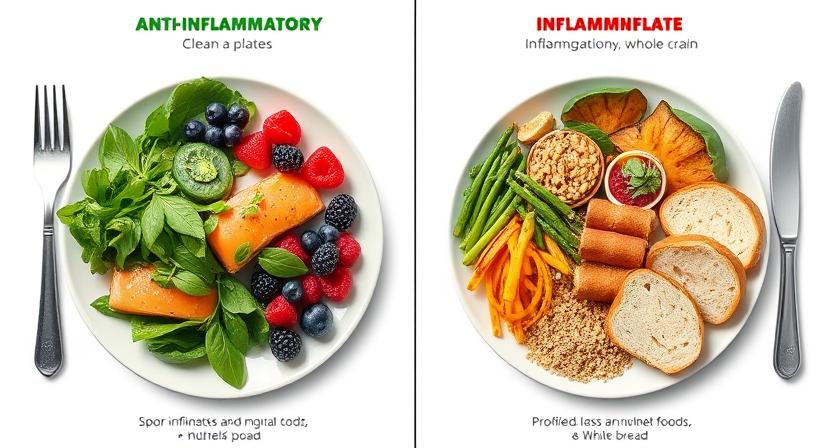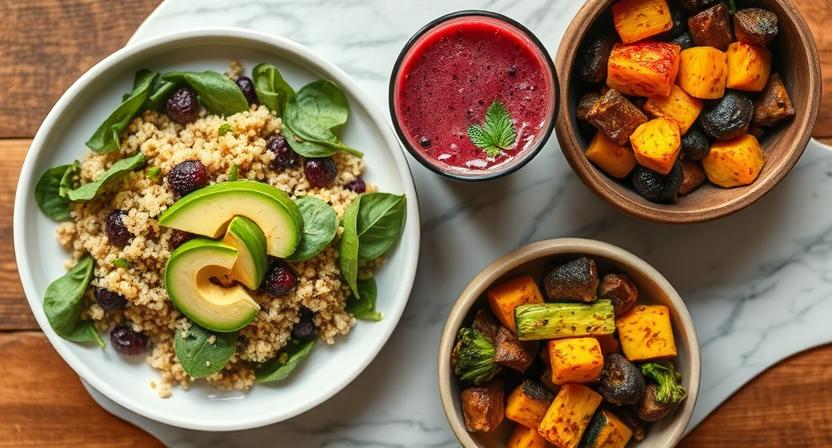Your plate is more than just a place for flavor, it’s a powerful tool for preventing disease. By choosing foods that fight disease, you can strengthen your immune system, reduce inflammation, and protect your body from chronic conditions like heart disease, diabetes, and cancer. The science is clear: what you eat directly impacts your health. This blog post explores simple, actionable ways to incorporate immune-boosting foods, follow an anti-inflammatory diet, and prioritize nutrient-rich foods to enhance your well-being. Let’s dive into the foods that can transform your health and how to make them part of your daily life.
The Power of Foods That Fight Disease
Understanding Disease-Fighting Foods
Not all foods are created equal. Foods that fight disease are packed with vitamins, minerals, antioxidants, and other compounds that support your body’s natural defenses. These foods work by reducing oxidative stress, combating inflammation, and strengthening your immune system. For example, antioxidants found in fruits and vegetables neutralize free radicals, which can damage cells and lead to chronic diseases. According to the Harvard T.H. Chan School of Public Health, a diet rich in antioxidants can lower the risk of heart disease and certain cancers.
The Role of an Anti-Inflammatory Diet
Chronic inflammation is a silent driver of many diseases, including arthritis, Alzheimer’s, and cardiovascular issues. An anti-inflammatory diet emphasizes foods that reduce inflammation, such as fatty fish, leafy greens, and nuts. Omega-3 fatty acids, found in salmon and walnuts, are particularly effective at calming inflammation. By incorporating these foods into your meals, you can lower your risk of inflammation-related conditions and feel better overall.
Top Immune-Boosting Foods to Include in Your Diet
Citrus Fruits: Vitamin C Powerhouses
Citrus fruits like oranges, grapefruits, and lemons are renowned for their high vitamin C content. This nutrient is essential for producing white blood cells, which are critical for fighting infections. Eating a single orange can provide nearly 100% of your daily vitamin C needs. Try adding a slice of lemon to your water or enjoying grapefruit as a breakfast starter to kickstart your immune system.
Berries: Antioxidant-Rich Superfoods
Berries, including blueberries, strawberries, and raspberries, are loaded with antioxidants like anthocyanins. These compounds not only give berries their vibrant colors but also help protect your cells from damage. Studies suggest that blueberries may improve heart health and cognitive function. Blend them into smoothies or sprinkle them over yogurt for a delicious dose of nutrient-rich foods.
Leafy Greens: Versatile and Nutrient-Dense
Spinach, kale, and Swiss chard are nutritional powerhouses packed with vitamins A, C, and K, as well as folate and fiber. These immune-boosting foods support overall health by promoting healthy digestion and reducing inflammation. Sauté spinach with garlic for a quick side dish or toss kale into a salad for a crunchy, nutrient-packed meal.
Garlic and Ginger: Nature’s Antibiotics
Garlic and ginger have been used for centuries for their medicinal properties. Garlic contains allicin, a compound with antimicrobial effects, while ginger is known for its anti-inflammatory and immune-boosting benefits. Add minced garlic to soups or grate fresh ginger into stir-fries to enhance both flavor and health.

Building Healthy Eating Habits for Long-Term Benefits
Prioritize Whole, Unprocessed Foods
The foundation of a disease-fighting diet is whole, unprocessed foods. These include fruits, vegetables, whole grains, lean proteins, and healthy fats. Unlike processed foods, which are often high in sugar and unhealthy fats, whole foods provide the nutrients your body needs to thrive. Aim to fill at least half your plate with vegetables and fruits at every meal to maximize your intake of nutrient-rich foods.
Practice Portion Control and Balance
Even healthy foods can lead to weight gain if eaten in excess. Practicing portion control and balancing your macronutrients, carbohydrates, proteins, and fats, ensures you’re fueling your body without overloading it. For example, pair a serving of quinoa (a complex carb) with grilled chicken (protein) and avocado (healthy fat) for a balanced, satisfying meal.
Make Gradual Changes for Lasting Results
Transitioning to a diet full of foods that fight disease doesn’t have to be overwhelming. Start by adding one new healthy food to your meals each week. Swap out sugary snacks for fresh fruit or replace white bread with whole-grain options. Over time, these small changes will become healthy eating habits that stick.
Practical Tips for Incorporating Disease-Fighting Foods
Plan Your Meals Ahead
Meal planning is a game-changer for sticking to an anti-inflammatory diet. Set aside time each week to plan your meals and create a grocery list. This ensures you have immune-boosting foods on hand and reduces the temptation to reach for unhealthy options. Try batch-cooking dishes like vegetable soups or quinoa salads for quick, nutritious meals.

Experiment with New Recipes
Eating healthy doesn’t mean sacrificing flavor. Explore new recipes that feature nutrient-rich foods to keep your meals exciting. For inspiration, check out our Guide to Plant-Based Eating for Beginners for delicious, disease-fighting meal ideas. From turmeric-spiced roasted vegetables to berry-packed smoothie bowls, there’s no shortage of tasty options.
Stay Hydrated and Limit Sugary Drinks
Hydration is key to overall health, but sugary drinks like soda and sweetened coffee can undermine your efforts. Opt for water, herbal teas, or infused water with citrus or cucumber to stay hydrated without added sugars. Proper hydration supports digestion and helps your body absorb the nutrients from foods that fight disease.
Conclusion: Take Control of Your Health Today
Incorporating foods that fight disease into your diet is one of the simplest and most effective ways to boost your health. By prioritizing immune-boosting foods, following an anti-inflammatory diet, and building healthy eating habits, you can protect your body from disease and feel your best. Start small, stay consistent, and watch how these nutrient-packed foods transform your well-being. Your body will thank you!










Discussion about this post